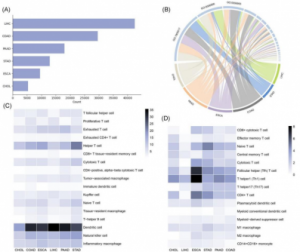Immune gene ontology fingerprint mapping uncovers targets in GI cancers
FAYETTEVILLE, GA, UNITED STATES, August 1, 2025 /EINPresswire.com/ -- A new study has uncovered a distinct pattern of immune-related genes in hepatobiliary cancers, setting them apart from other gastrointestinal tumors.
Gastrointestinal (GI) cancers are among the most prevalent and deadly malignancies worldwide, with increasing incidence in younger populations. Despite advances in diagnosis and therapy, many GI tumors remain challenging due to their complex biology and limited treatment options. The tumor microenvironment (TME)—including immune cell interactions and gene expression dynamics—plays a crucial role in disease progression. While some progress has been made in immunotherapy for GI cancers, specific immune-related patterns in hepatobiliary cancers remain poorly defined. Due to these challenges, there is an urgent need to comprehensively investigate the immune-related molecular characteristics of hepatobiliary cancers to improve diagnostics and therapeutic strategies.
A research team from Tongji University and collaborating institutions published a comprehensive study (DOI: 10.1093/pcmedi/pbaf014) on July 24, 2025, in Precision Clinical Medicine, unveiling hepatobiliary-specific immune gene signatures in GI cancers. By applying a novel explainable gene ontology fingerprinting (XGOF) method, the team combined gene expression, mutation, and methylation data from public databases and clinical samples to map immune gene patterns. Their findings provide new insights into the molecular landscape of HCC and ICC and open avenues for targeted immunotherapy development.
Using data from over 1,800 GI cancer samples, the team constructed a gene ontology network (XGOF) and analyzed six major GI cancer types across three omics levels—expression, mutation, and methylation. Among these, hepatobiliary tumors (hepatocellular carcinoma and intrahepatic cholangiocarcinoma) demonstrated unique immune-related gene patterns, distinct from other GI cancers. The study identified seven immune genes with significantly reduced expression in hepatobiliary tumors, of which six—LBP, FGA, MBL2, C9, ARG1, and APCS—were validated via qPCR, Western blotting, and bisulfite sequencing. Notably, the LBP gene showed promoter hypermethylation in cholangiocarcinoma, correlating with its reduced expression. Single-cell sequencing revealed that these downregulated genes were enriched in hepatocytes and cholangiocytes, especially in pathways related to innate and humoral immunity. The team also discovered that the macrophage migration inhibitory factor (MIF) pathway was elevated in tumor tissues, suggesting its role in immune evasion. Immunofluorescence confirmed high MIF expression in cholangiocarcinoma, reinforcing its role in tumor-immune interactions.
“Our study provides a multi-layered view of immune dysregulation in hepatobiliary cancers,” said Prof. Xiaoyan Zhang, co-corresponding author from Tongji University. “By identifying immune-related genes with tumor-specific downregulation and linking them to altered methylation and microenvironment interactions, we uncover potential biomarkers and therapeutic targets. This approach not only improves our understanding of liver and bile duct cancer biology but also offers practical value for early diagnosis and immune-based treatments.”
These findings present promising clinical opportunities for diagnosis and treatment. Several of the identified genes—such as ARG1, APCS, and C9—could be included in biomarker panels for early detection using ELISA or liquid biopsy techniques. Additionally, targeting MIF signaling with small-molecule inhibitors or anti-MIF/CD74 antibodies may help disrupt immune-suppressive communication between tumor and immune cells. The study lays the groundwork for future multi-center trials to validate these markers and explore immunotherapeutic applications. Ultimately, the integration of gene expression, epigenetics, and single-cell data offers a precision medicine roadmap for managing hepatobiliary cancers.
References
DOI
10.1093/pcmedi/pbaf014
Original Source URL
https://doi.org/10.1093/pcmedi/pbaf014
Funding Information
This work was supported by the National Natural Science Foundation of China (grant Nos. 32370694 and 81972914), Shanghai Public Health Research Project (grant No. 2024GKM25), and the Innovation Group Project of Shanghai Municipal Health Commission (grant No. 2019CXJQ03)
Lucy Wang
BioDesign Research
email us here
Legal Disclaimer:
EIN Presswire provides this news content "as is" without warranty of any kind. We do not accept any responsibility or liability for the accuracy, content, images, videos, licenses, completeness, legality, or reliability of the information contained in this article. If you have any complaints or copyright issues related to this article, kindly contact the author above.

